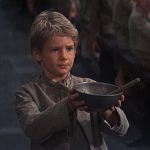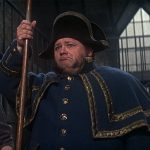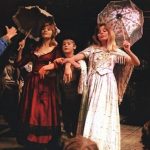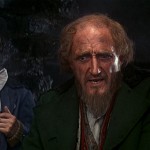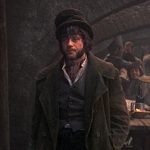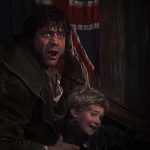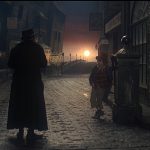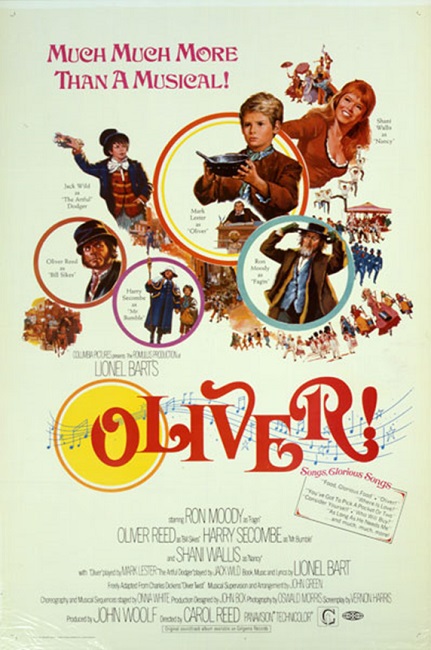
Oliver! – 1968
“Please, sir, I want some more.” That is the famous line from this Best Picture winner. Oliver! is the story of an orphan on the streets of London, based on the Charles Dickens novel Oliver Twist. It was nominated for eleven Awards and won six. Besides Best Picture, it took home Oscars for Best Director (Carol Reed), Best Adaptation Score, Best Art Direction, Best Sound, and a special Academy Award for Choreography.
I guess I have to make a big admission before I go any further. I have never been a fan of children singing. Unfortunately, seventy percent of this film is just that. I went into watching it with a closed mind. For some reason, I was determined not to like the movie. I sat down to watch it, telling myself that it would all be over in two hours.
But watch it I did. And you know, it wasn’t as bad as I had been expecting. I still don’t care for children singing or boy sopranos. But darn it if the songs weren’t so catchy that I found myself humming them for the next several days. Grudgingly, I had to admit that the musical had done its job, and done it well. Not only was the music good, but the choreography was especially well executed. The cast of extras included probably around seventy or eighty young children who’s precision in the complex dance moves was pretty impressive.
The title role of Oliver Twist was played by a ten year old boy named Mark Lester, who I have to admit, was a very attractive child. He had beautiful blond hair and an angelic face. He also had a thousand watt smile that must have dazzled the casting director. His acting was passable, though it is a rare thing to find a child actor who does not act like a child actor.
Interesting note: As perfect as he looked, apparently, he couldn’t sing to save his life. He was dubbed by Kathe Green, the daughter of Johnny Green, the musical director. The confusing thing, though, is the fact that this fact was not made public until 1988. However, I found it painfully obvious that he was dubbed even before confirming the fact in my research.
Another interesting note: Even though the role of Oliver Twist was the title role of the movie, Mark Lester was nominated for Best Supporting Actor, though he did not win.
Playing the fun role of the Artful Dodger, was a young man named Jack Wild. I was actually pretty impressed with his performance. Not only were his dance moves performed like a pro, he also did, in my opinion, a better job as a young actor than Mark Lester. He was jolly well cheeky, something that I usually find particularly annoying from child actors, but with him, and within the context of the plot, it was completely appropriate. He pulled it off well without making me want to roll my eyes.
Then, there were the adult actors. There were three that were really worth mentioning and one to whom I will give an honorable mention. The first of the three was Ron Moody as the slick and despicable criminal Fagin, who takes in young boys off the streets of London and teaches them to be a gang of pick-pockets. Moody was fun to watch, even though he was clearly an evil man, looking out for nobody but himself. His comical song, Reviewing the Situation, was really quite funny.
Playing opposite him as the dangerous and violent thief, Bill Sykes, was Oliver Reed. I thought I had only seen Oliver Reed in one other film role, and that was the sleazy step-father in The Who’s Tommy. He was sleazy then and he was sleazy in Oliver! But I found that he had a long list of films under his belt, not the least of which was the 2000 Best Picture winner, Gladiator. Judging by his performance in Tommy, I can only imagine that Reed is not the best singer. But instead of dubbing his voice in the songs, the decision was made to simply cut his two songs when adapting the stage show for the silver screen.
The third actor that caught my attention was Harry Secombe as Mr. Bumble, the man who runs the workhouse in which Oliver utters that famous line, “Please, sir, I want some more.” Apparently just asking the question is enough to get a boy kicked out of the workhouse and sold into virtual slavery to anyone willing to buy him. But as Mr. Bumble tries to sell the lad, he sings the song Boy For Sale. His clear tenor voice caught my attention, as did his somber visage as he led Oliver through the snowy streets.
The honorable mention I eluded to earlier is really the only prominent female member of the cast. Shani Wallis played the part of Nancy, Bill Sykes’ girlfriend. Her character was actually pretty pitiful, when examined with a cold eye. Her self-esteem and self-worth are so low that she literally convinces herself that she is happy with her life of poverty, being the girlfriend of a dangerous thief who treats her like garbage. That is, until act two, where she finally finds the courage to defy him in order to help Oliver. Unfortunately, this quickly gets her killed off. Sorry, Nancy.
When it really comes down to it, though, the biggest star of the film was the music. Lionel Bart wrote a score full of memorable songs that, despite having never seen the show, I somehow already knew and liked. Songs like Food, Glorious Food, Consider Yourself, Pick a Pocket or Two, It’s A Fine Life, I’d Do Anything, Who Will Buy, and Oom-Pah-Pah. Their melodies stick in the brain and linger there, playing their tune whether you know the words or not. And even the music I didn’t know was good music to listen to.
With one exception… There is one song in the show that I never liked. Not because it was badly written or even because it was sung by a boy soprano (Or in this case, a little girl.) The song Where is Love has always annoyed me because it is deliberately sappy and sickeningly sweet. For me, it was like overkill on the cute. The darling little ten-year-old orphan boy is singing a nobody-loves-me song as he is imprisoned in a dark and cold basement all alone. Boo-hoo!!! And who else is there to blame for this except Lionel Bart?
The sets and costumes were, both authentic and appropriately filthy dirty, displaying the squalor of the young orphan boys in the workhouse, and the street rats and pick-pockets of London. That being said, though, Hollywood dipped its pristine little finger into the pie and made everyone from the peasants to the gentry beautiful. Even the poor drunkards at the tavern where Nancy works are attractive under their dirt make-up. I may not have cared for the film Tom Jones, but at least they got that part right. Their poor and wretched peasants were not the prettiest lot.
As much as I wanted to find flaws with Oliver, I couldn’t find enough to call it a bad movie. Its good qualities were enough to overcome my pre-conceived notions about how sappy and horrible a show it would be. I guess you could say I liked it despite myself, and that’s saying a lot. It is like the little musical that could, and in the end it earned my respect. Well done, Oliver!

